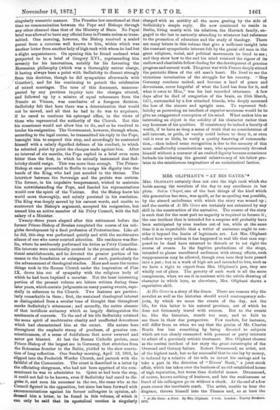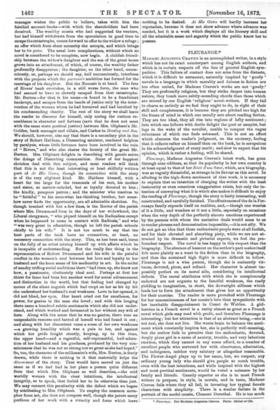MRS. OLIPHANT'S "AT HIS GATES."*
MRS. OLIPHANT certainly does not owe the high rank which she holds among the novelists of the day to any excellence in her plots. Salem Chapel, one of the best things of the kind which this generation has seen, was spoilt, as far as spoiling was possible, by the absurd melodrama with which the story was wound up ; and the merits of At 114 Gates are certainly not enhanced by any skill in the construction of the narrative. The course of the story is such that for the most part no sagacity is required to foresee it ; the one incident that is intended for a surprise will probably have been anticipated by nine readers out of ten, while at the same time it is so improbable that a writer of eminence ought to con- sider it beyond the limits of legitimate art. Let Mrs. Oliphant. reflect how very seldom it has happened in real life that men sup- posed to be dead have returned to disturb or to set right the course of events. In the fugitive productions of the stage, intended to please uncultured audiences with strong effects, such reappearances may be allowed, though even here they have passed into a jest ; but in a work of high art and intended to live, such as we have a right to expect from Mrs. Oliphaut's pen, they are wholly out of place. The poverty of such work is all the more conspicuous, when we see it in contrast with the subtle drawing of character in which here, as elsewhere, Mrs. Oliphant shows a. superlative skill.
At His Gates is a story of the times. There are reasons why the novelist as well as the historian should avoid contemporary sub- jects, by which we mean the events of the day, not the life, for this latter is his natural province, out of which he does not commonly travel with success. But to the evente he, like the historian, stands too near, and so fails to seethem in their due perspective. Few readers, for instance, will differ from us when we say that the genius of Mr. Charles Reade has lost something by being directed to subjects which are too closely connected with personal or party interests to admit of a genuinely artistic treatment. Mrs. Oliphant chooses as the central incident of her story the groat catastrophe of the Overend and Gurney failure. Robert Drummond, an artist, not of the highest rank, but so far successful that he can lay by money, is induced by a relative of his wife to invest his savings and to take a part in the direction of "Rivers' Bank," a joint-stock affair, which has taken over the business of an old-established house of high reputation, but worse than doubtful means. Drummond, of course, knows nothing of business, and lets the recklessness or fraud of his colleagues go on without a check. At the end of a few years comes the inevitable crash. The artist, unable to bear the disgrace, throws himself into the Thames and, so at least the • At His Gates: a Noma. By Mrs. Oliphant. 8 vols. London Tinsley Brothers. 5172. manager wishes the public to believe, takes with him the falsified account-books—with which the shareholders had been deceived. The wealthy cousin who had suggested the venture, but had himself withdrawn from the speculation in good time to escape the catastrophe, comes forward to offer to the widow a refuge ; an offer which from sheer necessity she accepts, and which brings her to his gates. The usual love complications, without which no novel is considered to be complete, now begin. A childish friend- ship between the widow's daughter and the son of the great house grows into an attachment, of which, of course, the wealthy father profoundly disapproves ; the daughter, on the other hand, uncon- eciously, or, perhaps we should say, half unconsciously, interferes with the projects which the parvenu's ambition has formed for the marriage of his daughter. But the Nemesis is at hand. The fate of Rivers' bank overtakes, in a still worse form, the man who had seemed to have so cleverly escaped from that catastrophe. Mr. Burton—for that, is his name—is found to be a fraudulent bankrupt, and escapes from the hands of justice only by the inter- vention of the woman whom he had bereaved and had insulted by his condescending charity. The rest of the story we shall leave the reader to discover for himself, only noting the curious re- semblance in character and fortune (save that he does not meet with the same stern poetical justice) between Mrs. Oliphant's Mr. Golden, bank manager and villain, and Carker in Dombey and Son. We should, however, also say that there is a secondary plot in the story of Robert Haldane, a Dissenting minister, rendered helpless by paralysis, whose little fortunes have been involved in the ruin of"Rivers," and who also shares the bounty of the great Mr. Burton. Mrs. Oliphant delights in describing with gentle satire the doings of Dissenting communities. Some of her happiest sketches deal with this subject, and most readers will think that this is not the least interesting or least skilfully written part of At His Gates, though its connection with the story is of the very slightest kind. Mr. Haldane himself, with a heart far too large for the trammels of his sect, his mother -and sister, so narrow-minded, but so loyally devoted to him ; the kindly, pompous patron ; and the minister who resolves to be " faithful " to his somewhat lax-thinking brother, but some- how never finds the opportunity, are all admirable sketches. So, though touched with but a few lines, is the Rector of the parish where Mrs. Drummond lives in the days of her widowhood, the Liberal clergyman, "who piqued himself on his Radicalism except when he happened to come in contact with Radicals," and who 4 was very great in education, though he left the pariah schools 'chiefly to his wife." It is not too much to say that the best parts of the book have no connection, at least, no necessary connection with the story. This, as has been said, turns on the folly of an artist mixing himself up with affairs which he is incapable of understanding. But the really fine thing in the representation of Robert Drummond and his wife is the painful .conflict in the woman's soul between her love and loyalty to her husband and the keen sense of his mediocrity in art. In the midst nf sundry trifling social ambitions there "bad risen up, she knew not how, a passionate, obstinately ideal soul. Perhaps at first her thirst for fame had been but another word for social advancement and distinction in the world, but that feeling had changed by means of the silent anguish which had crept on her as bit by bit she understood her husband's real weakness. Love in her opened, it -did not blind, her eyes. Her heart cried out for excellence, for power, for genius in the man she loved ; and with this longing there came a hundred subtle sentiments which she did not under- stand, and which worked and fermented in her without any will of hers. Along with the sense that he was no genius, there rose an 'unspeakable remorse and hatred of herself who had found it out ; and along with her discontent came a sense of her own weakness —a growing humility which was a pain to her, and against which her pride fought stoutly, keeping, up to this time, the upper hand—and a regretful, self-reproachful, half-adora- tion of her husband and his goodness, produced by the very con- sciousness that he was not so strong nor so great as she had hoped." So, too, the character of the millionaire's wife, Mrs. Burton, is finely drawn, while there is nothing in it that materially helps the denouement of the story. That would have moved on just the same as if we had had in her place a person quite different from that which Mrs. Oliphant so well describes, —the cold worldly woman with the clear intuitions, the intellectual integrity, so to speak, that forbid her to be otherwise than just. We may connect this peculiarity with the defect which we began by attributing to Mrs. Oliphant. To employ the common meta- phor from art, she does not compose well, though she paints many portions of her work with a vivacity and force which leave
nothing to be desired. At His Gates will hardly increase her reputation, because it does not show advance where advance was needed, but it is a work which displays all the literary skill and all the admirable sense and sagacity which the public know her to possess.



































 Previous page
Previous page